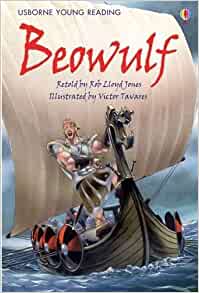Our Summer 1 and 2 Journey
Our curriculum web for Summer 1 and 2.
English - Beowulf
As our history topic for Summer 1 and 2 is dedicated to Anglo-Saxons, we will be completing various English activities linked to the story 'Beowulf'.

Reading Phase:
At the moment, we are in the 'reading phase'. At the start, we had an image which gave us some clues as to what the text was about. Working in groups, we predicted the following:
- What could the story be about?
- Where could the story be set?
- Who are the main characters?
- What could happen in the story?
Then, we participated in a couple of recipricol reading sessions which gave us more information about the text. Part of the recipricol reading involved us asking questions about the text.
Once we had spent a few lessons on prediction, we read the story. Then, we practised our comprehension skills by focusing on retrieval, inference and vocabulary skills.
Maths - Money and Time
Science - Sound
Topic - Anglo-Saxons and Vikings
Anglo-Saxon Day
To begin our new history topic on The Anglo-Saxons we had an immersion ‘Let’s Say’ day to ensure we were all heavily invested in our learning. We started the day by completing a ‘keeping everything spinning’ that involved key knowledge from last key-stage, last year and last half-term that would connect and help us with our new learning today.
We were then introduced to this timeline and discussed what we could see and what we noticed. We were told ‘Let’s Say that we live in Britain in AD547’... We discussed
- Which period of history do we live in?
- What do we know about the period of history before it?
- If we lived then, what wouldn’t we have had that we have today?
We then compared a map of Britain from AD547 to now and talked about what was the same and what was different.
We were told that we had to imagine we lived in Bamburgh in Northumbria in AD547. We discussed what sorts of jobs we thought there would be and what sort of rules were needed.
Next, we were lucky enough to meet ‘Edward’ – a 50 year old man who had lived in Bamburgh all his life. We were able to talk to Edward and ask about his life – his community, his home, his daily activities, his job, his family etc. We were then told that the King of Bamburgh had been notified that the Anglo-Saxons who had been invading the South of Britain were travelling up North. We discussed what we could do and then we took on the role of the King of Bamburgh to write a persuasive speech to the villagers, to rally the troops and encourage them to fight and defend the village.
As a group, we discussed what the villagers of Bamburgh would be feeling and thinking at this time. We then discussed how we would need to prepare for battle, before then spending time designing and making our own British and Anglo-Saxon swords and shields. Finally, we were ready for battle! We were split into a Roman and Anglo-Saxons army and we re-enacted a battle … learning that the Anglo-Saxons were triumphant and successfully took over Bamburgh and the kingdom of Northumberland. We learnt that the Britain’s who remained re-treated and escaped to Wales1
To end our day immersed in Anglo-Saxon invasions, we took on the role of the Anglo-Saxons post battle and had a celebratory feast. We thought about what both the Anglo-Saxons (victorious in battle) and the British (defeated and homeless) could have been thinking, feeling and saying.
Royal Ballet and Opera

